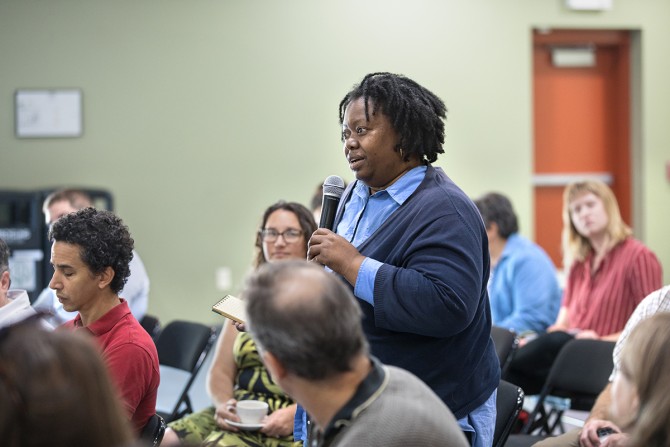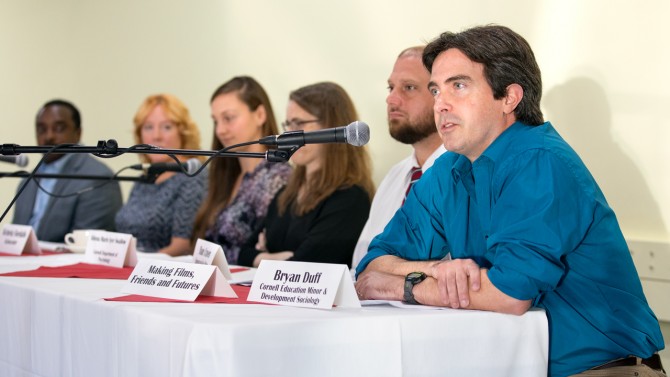Community engagement initiatives deliver reciprocal benefits
By Elizabeth Kelley
In the three years since its inception, Engaged Cornell has inspired new and deepening partnerships between Cornell and local organizations in Tompkins County and beyond. To date, 122 Engaged Cornell grants have been awarded, collaborating with more than 60 Tompkins County partners in community-based learning and research.
On Sept. 27, a forum in downtown Ithaca with faculty, staff, and partners offered stories of experiences and answered questions about implementing community-engaged initiatives. The forum was cosponsored by the Office of Community Relations, the Office of Engagement Initiatives in collaboration with the Community Foundation of Tompkins County.
Bryan Duff, senior lecturer of development sociology, and Dan Craven, guidance counselor at Spencer-Van Etten Middle School, discussed some of the challenges and successes of their Summer Film Academy, a project to address summer learning loss among middle school students. The partnership brought rural middle schoolers to Cornell to partner with undergraduates in making films, fostering creativity while developing writing skills, visual literacy and collaboration strategies.
Data from standardized testing show that summer learning loss among participating students was either nonexistent or less severe than for the general student population. Undergraduates managing the program also benefitted from the exposure to challenges unique to rural education, which many of them had never encountered, Duff said.
Khena M. Swallow, assistant professor of psychology, presented with Ithaca Sciencenter’s Victoria Fiordalis on their partnership, in which Cornell students proto-typed educational exhibits for display at the Sciencenter. Students were challenged to put abstract psychological ideas into physical displays, simultaneously finding a way to make the concepts of psychology accessible and engaging to young children, their parents, and others who visit the center.
The partnership, Swallow said, also allowed the Sciencenter to be “one of the few places in the country that has a large bank of exhibits on psychology and the brain,” and involved Sciencenter guests in a review of the exhibits.
Amy Emerson, adjunct Cornell Law professor, and J.R. Clairborne, advocacy coordinator at Ithaca’s Loaves and Fishes food bank, discussed the Cornell Legal Research Clinic, which provides free legal counseling to community residents.
These clients, Emerson said, “don’t necessarily have a case yet, but have questions of a legal nature that need to be answered. They need some legal advice, and they can’t necessarily afford to go out and hire an attorney for that purpose.” The clinic is not topic-specific and has worked with low-income individuals, nonprofit organizations and local entrepreneurs. Cornell law students who work in the clinic gain valuable experience with real-world projects.
A question and answer period, moderated by George Ferrari ’84, executive director of the Community Foundation of Tompkins County, gave participants a chance to raise issues such as how to connect to Cornell if you don’t know anyone there; people were invited to contact the Office of Engagement Initiatives or the Public Service Center.
Each of the speakers emphasized the mutual benefits in these programs.
In her welcoming remarks, Vice Provost Judy Appleton underscored this and other import aspects of these partnerships. “There should be a reciprocity of benefit here: a benefit to the community organization, and a benefit to the student, and this is all based on the fact that there is an exchange of knowledge,” said Appleton. “There is knowledge that lives in the community that can be shared with Cornell students and faculty along with … knowledge coming from Cornell.”
Elizabeth Kelley ’19 is a writer intern for the Cornell Chronicle.
Media Contact
Get Cornell news delivered right to your inbox.
Subscribe
